Announcer:
The following program is a PBS Wisconsin original production.
Janet Protasiewicz:
So help me God.
Ann Walsh Bradley:
Ladies and gentlemen, our justice.
Frederica Freyberg:
Janet Protasiewicz is sworn in as the newest Wisconsin Supreme Court justice and less than 24 hours later, a redistricting lawsuit is filed before the new court.
I’m Frederica Freyberg. Tonight on “Here & Now,” we speak to the attorney who filed the redistricting lawsuit and discuss Wisconsin’s central role in the Trump indictment. Plus, a bill allowing advanced nurses to practice independently has broad support, but physicians want more safeguards in place. It’s “Here & Now” for August 4.
Announcer:
Funding for “Here & Now” is provided by the Focus Fund for Journalism and Friends of PBS Wisconsin.
Frederica Freyberg:
Janet Protasiewicz was elected to the Wisconsin Supreme Court last April in the most expensive court race in our nation’s history. Her 10-year term on the court started Tuesday with a ceremonial investiture at the state Capitol. “Here & Now” senior political reporter Zac Schultz tells us her supporters have high expectations for the new liberal majority on the court.
Ann Walsh Bradley:
And will faithfully…
Janet Protasiewicz:
And will faithfully…
Ann Walsh Bradley:
And impartially…
Janet Protasiewicz:
And impartially…
Zac Schultz:
Janet Protasiewicz took the oath of office to join the Wisconsin Supreme Court in the Capitol rotunda Tuesday.
Ann Walsh Bradley:
Ladies and gentlemen, our justice.
Zac Schultz:
In her speech, she said all the things an impartial justice should say.
Janet Protasiewicz:
The Wisconsin Supreme Court’s execution of our duties without favor to special interests, political pressure or our own personal beliefs is vital to giving the people of our state trust and confidence in our judicial system.
Zac Schultz:
But everyone in the crowd of friends and colleagues understood her investiture means the court will now have a liberal majority after 15 years of conservatives controlling the court.
Ann Walsh Bradley:
How wonderful. What an amazing day.
Zac Schultz:
Justice Ann Walsh Bradley has served on the court for 28 years and hinted that changes to come, like opening up the judicial process to more transparency.
Ann Walsh Bradley:
Our challenge, the challenge of the seven justices, all of us on the Supreme Court, is to work to enhance the public trust and confidence of the people in the judiciary and return this court to the national reputation that it once enjoyed.
Zac Schultz:
Protasiewicz campaigned by talking about her values on issues like abortion and gerrymandering but has not referenced those topics by name since her election in April.
Janet Protasiewicz:
The issues that will come before this court are complex. Many of them deal with our most basic rights that are outlined in our constitution. Decisions that this court will be making will impact some of the most important aspects of our daily lives.
Zac Schultz:
As Wisconsin’s non-partisan Supreme Court elections have become more partisan, voters have started expecting partisan results from their candidates. Conservatives have been angry with Justice Brian Hagedorn for years because he occasionally sides with the liberals on the court. What do Protasiewicz’ s supporters expect of her on the court?
Brenda Ashley:
Well, we expect it to be liberal now and for women’s rights also, and she’s fair, so we expect fairness.
Natalie Guimont:
And I think that she’ll be able to really uphold her ideals that she ran with, as was stated in her campaign. She is very, like, moral — she sticks to her morals.
Zac Schultz:
Chris Taylor is a former Democratic legislator and is now a Wisconsin appellate court judge.
Chris Taylor:
She has certain values that she holds, that she talked a lot about that are shared by the people of the state of Wisconsin. I think she’s going to bring those values to the bench without prejudging what’s before her, but the big message I think here is fairness and giving every person a chance to get the justice they need from the state Supreme Court.
Zac Schultz:
Protasiewicz directed one portion of her speech to her colleagues, but the message applied to all her supporters.
Janet Protasiewicz:
But I’m ready to get to work and I’m ready to deliver justice and common sense as a member of this court.
Zac Schultz:
Reporting from Madison, I’m Zac Schultz for “Here & Now.”
Frederica Freyberg:
Literally less than 24 hours after Justice Protasiewicz took the bench, a liberal leaning firm filed a lawsuit in the Wisconsin Supreme Court over the state’s current legislative voting maps. Board president of Law Forward Jeff Mandell brought the redistricting litigation. He’s here now. Jeff Mandell, thanks very much for being here.
Jeff Mandell:
Thank you for having me.
Frederica Freyberg:
So you wasted no time in filing this redistricting lawsuit before the Wisconsin Supreme Court now with its brand-new liberal majority, but why go there first and not a lower court?
Jeff Mandell:
Well, there’s really no time to waste. The issue is not how many days in August. The issue is that for 12 years, the people of Wisconsin have been living under this extreme partisan gerrymander, and every day that the gerrymander continues to distort politics and policy in the state of Wisconsin is an affront to our constitution and an affront to our democracy and a violation of the rights of the people of Wisconsin. So we want to get this gerrymander taken down and fixed so that we can have fair maps and a workable democracy after the 2024 election. If we want that to happen, we need the court to move quickly and we need to ask it quickly.
Frederica Freyberg:
What are the legal prongs of your suit?
Jeff Mandell:
This suit is really about the Wisconsin Constitution and the fact that the gerrymander and the current maps violate the Wisconsin Constitution. No one has ever asked these questions before but we believe that the extreme partisan gerrymander that we have that distorts our government in Wisconsin violates several provisions of our state constitution, including the equal protection clause, the right to free speech, the right to free assembly, and the preservation of free government clause that is in Article 1, Section 22 of the constitution. In addition, there are other problems with our current maps, including that they fail to meet even the bedrock requirement in the constitution that the districts be contiguous. That is that all the people who live within a district and have one representative all live within one block on a map. That’s not the case. And, on top of it, the way these maps were imposed by the Supreme Court last year violates our separation of powers. Of the 99 Assembly districts in the state of Wisconsin, 55 of them are non-contiguous, and of the 33 Senate districts, 21 are non-contiguous. Right here in the Madison area, Assembly districts 47, 77 and 78 all have clear non-contiguities and islands of territory floating apart, but it’s not just here in the Madison area. District 88 in the Green Bay area, district 91 in the Eau Claire area, and those are all just examples. As I said, the vast majority of them are like this.
Frederica Freyberg:
Here’s what, speaking of the Senate, here’s what Republican Senate Majority Leader Devin LeMahieu said about your lawsuit. He said, “liberal democrats are counting on judicial fiat to help them gain power. It’s clear liberal interest groups are coming to collect from Janet Protasiewicz.” What do you say to that?
Jeff Mandell:
Well, you know, lawyers have a saying that when the facts are on your side, you yell about the facts. When the law is on your side, you yell about the law. And when nothing is on your side, you pound the table. It sounds like a lot of pounding the table. What we didn’t hear yesterday in response to our lawsuit was anyone coming out and trying to defend the extreme partisan gerrymander because it is simply indefensible.
Frederica Freyberg:
In another major case, having driven the inquiry into Wisconsin’s false electors from very early on after the 2020 election, and being currently in court with your own lawsuit on this, what’s your reaction to the federal indictment against Donald Trump as it treats fraudulent electors in battleground states, including Wisconsin?
Jeff Mandell:
I guess my reaction is really that I was gratified to see the United States Department of Justice taking the fraudulent elector scheme so seriously. I don’t have strong feelings about — and I’m not a criminal prosecutor and I trust the criminal prosecutors to do their job, so I don’t have strong feelings or opinions about the details of the indictment or the specific charges against former president Trump, but what I took from it, as someone who has been litigating the fraudulent electors here in Wisconsin is just how seriously the United States Department of Justice takes this scheme and how much the indictment shows that this really was a serious attack upon and threat to our democracy.
Frederica Freyberg:
What are you seeking in that lawsuit?
Jeff Mandell:
We’re looking to make sure that happen none of these folks who abused the trust of their neighbors in Wisconsin, we’re talking about 10 people who decided they knew better than almost 3.3 million of their neighbors, and even though Joe Biden and Kamala Harris had won the free, fair election in the state of Wisconsin, they none the less were going to dedicate the state of Wisconsin’s electoral votes. The state’s only real participation choosing the next president, they were going to give that to Donald Trump and Mike Pence. We want to make sure that because they abused the public trust that way, they never have the chance to serve as electors again.
Frederica Freyberg:
Jeffrey Mandell, thanks very much.
Jeff Mandell:
Thank you for having me.
Frederica Freyberg:
Given a healthcare provider shortage in Wisconsin, proposed legislation would, for the first time, create a separate license for advanced practice registered nurses. Those kind of nurses include certified nurse midwife, certified registered nurse anesthetist, clinical nurse specialist and nurse practitioner. Under the bill, they would be able to practice without physician oversight. The Medical Society of Wisconsin opposes the measure in its current form and we’ll hear from a physician from that group in a moment. But first, we hear from one of the bill’s authors and a nurse herself, Senator Rachael Cabral-Guevara. Thanks very much for being here senator.
Rachael Cabral-Guevara:
Thank you for having me here today.
Frederica Freyberg:
So why in your mind should Wisconsin allow advanced practice registered nurses to practice independently with really fewer restrictions?
Rachael Cabral-Guevara:
Yeah. So when you look at the research, there isn’t a lot out there that says we can’t practice autonomously. Currently in the state of Wisconsin, we have over 8,000 nurses here — nurse practitioners here in the state of Wisconsin and we’re doing a fantastic job. We work collaboratively with physicians as it is currently and we don’t anticipate with this bill passing with the autonomy that we still wouldn’t work in collaboration with physicians here in the state of Wisconsin. 27 other states do this and the outcomes have been absolutely amazing. When we talk with parents — excuse me, patients — patients are also asking for this. There are many nurse practitioners here in the state of Wisconsin that would love to open up clinics within rural districts and currently, by the way legislation is written, it’s almost impossible for that to happen. And so by dropping these regulations that we currently have, it will open the door for affordability, it will open the door for access and it will continue to provide a valuable service that many patients here in Wisconsin seek.
Frederica Freyberg:
So the Wisconsin Medical Society wants such nurses to have four years of experience, not the two called for in the legislative bill. Is that unreasonable?
Rachael Cabral-Guevara:
Well, when you look at the 27 other states, none of those states have four years for regulation. Every state is a little bit different. On average, I see around two, maybe a little bit more, maybe three, but Wisconsin would be the only state that requires four years prior to autonomy, and so we’re just asking if other states are doing this and they’re doing just fine and not seeing increase in concern or litigation, why do we seek four years? Many nurse practitioners that have gone on — many nurses that have gone on to be nurse practitioners, most of these individuals have been nurses on the floor, have worked with physicians, have managed these kind of things for five, 10, 20 years, sometimes even 30 years they’ve worked as a nurse and now we’re asking to have four years of prior experience when no other state is asked that.
Frederica Freyberg:
Currently, APRNs have to have these collaborative agreements to work with physicians. First, what are those and why don’t you want them?
Rachael Cabral-Guevara:
Yeah. So what they are is an agreement between that nurse practitioner and that physician that is kind of almost an oversight. Right? So if I had a question and I didn’t know how to manage a patient, I would call my collaborating physician and say, “Hey, give me some insight on this.” Now, the catcher with that is this collaborating physician agreement is never free and their costs can be from a few hundred dollars to a few thousand dollars or even a particular percentage of your business. I have seen that in some situations. Now that can be tricky, particularly if you’re a smaller clinic, or the other problem is to find that collaborating physician. Quite often, what you find is physicians nowadays work for large systems and those large systems have non-competes. So let’s say you’re a nurse practitioner in a rural area of Wisconsin or even an urban area of Wisconsin and you want to open a clinic, work autonomously and you start asking around to seek a collaborating physician. Sometimes it’s impossible to find it. You have to go out of state even to find somebody that can work as a collaborating physician because of the non-competes. I had a neighbor who is a physician, couldn’t do this. I have an ex-husband who is a physician, couldn’t do this because of the non-competes that are here in the state of Wisconsin. So it really causes a lot of problems, not only for cost when you’re talking about trying to provide affordable care to patients and you have to pay these exorbitant fees, but also finding that particular individual that can even offer to do these services.
Frederica Freyberg:
I think we need to leave it there. A lot more questions to ask, but thanks very much for your time today, Senator Rachael Cabral-Guevara. Thank you.
Rachael Cabral-Guevara:
Thank you. Looking forward to getting this passed and continuing to provide great care for the folks of Wisconsin.
Frederica Freyberg:
Some physicians say they are wary about the bill and want more patient protections, including our next guest, Dr. Don Lee, president of the Wisconsin Medical Society. Doctor, thanks very much for being here.
Don Lee:
Thank you for having me.
Frederica Freyberg:
So why doesn’t the Medical Society support this bill in its current form?
Don Lee:
Well, first, let me say I’m just so happy to be here. I’m proud to be a physician and part of it is just letting the public know that we’re here for you regardless, that we care about patients. I wanted to be a doctor since I was five years old and learned how to spell anesthesiologist. My dad is a practicing — was a practicing anesthesiologist in La Crosse and loved every minute of it and felt medicine was the best profession and I wanted to follow in his footsteps. He told me to study hard, so I did. I’m here to defend our medical profession because this is what we do is to save lives and help patients.
Frederica Freyberg:
And so are you suggesting that doctors have such a high bar to become a licensed physician that it’s not right that these other kinds of registered nurses, the advanced practice registered nurses should have parity?
Don Lee:
No, not at all. We – I work with APCs, advanced practice clinicians which includes APRNs, and it has been great. I also work with RNs, and there’s not just a physician shortage critical, but there’s a critical nursing shortage also. What I’m saying is it’s hard to compare medical school with a master’s degree nurse practitioner and it’s hard to compare residency, where we don’t see patients by ourselves. We’re in an academic center where an attending oversees all of our work and we have to pass a medical licensure, step one, step two, step three, to even practice independently. So I didn’t practice independently, if you will, until I was 32.
Frederica Freyberg:
And so supporters say requiring four years of real world, team-based experience instead of the two that’s in this bill boxes out advanced practice registered nurses. Why is that level, that four years of experience needed in your mind?
Don Lee:
Our position is to require four years of real-world, team-based care experience before an APRN can advance to practice independently. Current law does not allow that. We have moved. We are — not for the — we support not the status quo — if you get what I’m saying. Like we have moved in supporting independent nursing practice with modifications.
Frederica Freyberg:
Do you think that patient care safety is at risk under the proposal that’s being considered right now?
Don Lee:
Right. So there’s been a lot of studies about cost and quality of care, and I want to cite — and I want to cite the National Bureau of Economic Research in November 2022, the productivity of professions evidenced from the emergency department visits, and they use three years of veterans health and measurements of emergency department visits, and it finds that NPs use more resources and achieve worse outcomes than physicians, especially when dealing with complex patients, but as a physician, me personally right. I see a physician as my primary care doctor. My dad, if he has a physician, but I get it, there’s a physician shortage. It could take three to six months to see his physician so he sees an APC, which is earlier, but that APC is working directly together with a physician that introduces herself as I work with this physician and this bill would completely up end that.
Frederica Freyberg:
What about those collaborative agreements? You think that’s important?
Don Lee:
I mean, if I’m working with an APC, I and that APC are going to work our butt off to provide the best patient care. Doctors are not in healthcare to simply make money. That’s not why we became doctors. And so the vast majority of physicians work collaboratively, work with team-based care with nurse practitioners and APCs to help patients.
Frederica Freyberg:
Dr. Lee, thanks very much.
Last week, we spoke with a civil rights lawyer about new data that shows thousands of instances of grade school children with disabilities being secluded and restrained in Wisconsin schools in the last academic year. Attorney Jeff Spitzer-Resnick called the practices abusive and said the Department of Public Instruction’s response has been inadequate. Tonight we hear from Abigail Swetz, DPI communications director, and Tim Peerenboom, a school psychologist and DPI education consultant. Thanks to both of you for being here.
Abigail Swetz:
Thank you.
Frederica Freyberg:
I want to go first to you, Abigail. The recent DPI data release doesn’t name individual schools that are using seclusion and restraint. As a parent, could I find out if my child’s school was using these techniques? And if not, why not?
Abigail Swetz:
It’s a great question. The first thing to keep in mind about this is we’ve been collecting this data for three years and the law requires to us collect it and we decide to put it into a report and make that public. There are download files on our website that go into more detail than the report does.
Frederica Freyberg:
And so —
Abigail Swetz:
And I believe Tim has spoken to others about how we are able to show that information at a more granular level.
Frederica Freyberg:
And so as a parent, I could seek that out?
Abigail Swetz:
Yes.
Frederica Freyberg:
Tim, we know that seclusion and restraint is to be used as a last resort, according to DPI, and only in cases of imminent danger. But why is it at all?
Tim Peerenboom:
Well, for a couple of reasons. If there is imminent danger of physical harm to the student or the student’s classmates or anyone, that it sometimes, unfortunately, is necessary. So one way to think about it, why use it at all, is that in those moments, you might need to use physical restraint and that balancing test or the question is, is the risk of not doing a seclusion or not doing a restraint going to cause more harm than doing a physical restraint? So, for example, a student about to dart into heavy traffic. Not restraining that student from doing that could cause much more harm than actually restraining the student. Students being in a violent physical fistfight, not physically restraining a student could cause, would cause more harm than engaging in a physical restraint so why do it? The answer is to prevent further harm or prevent these intense, traumatic, dangerous situations from escalating and getting even worse.
Frederica Freyberg:
Abigail, why do some schools use it and others don’t? I mean, can DPI learn from schools that don’t engage in seclusion and restraint about what they do instead?
Abigail Swetz:
There are a lot of schools. The majority of our schools, actually, are not using this last resort because we don’t have to get to that point and there absolutely are lessons that we are learning about the structures and systems that we need to put into schools to make sure that they are trauma-informed and able to never reach this last resort. And also we’ve learned so much about the staffing that’s needed in that space and it’s one of the reasons we’ve been talking so much about trying to make sure we have the mental health supports we need for our students in our schools. I’ll just reiterate what Tim just said as well, that because this is a last resort, everything you do long before is so, so important. And also what you do after. We’ve also been learning so much about what happens after. What are these restorative conversations and how can we learn going forward?
Frederica Freyberg:
Tim, what does the DPI do with this data?
Tim Peerenboom:
The law doesn’t say we have to publish the data or doesn’t direct us to do anything with it, so when this all went into effect, we have a workgroup, a team that works on how do we want to address what we refer to as sort of outlier school districts — or schools, excuse me, schools that have a higher number of seclusion and restraint so when we get those in response, when we review the data that we get each year, we directly contact those schools who have higher numbers and work with them to identify the root cause of what’s causing those higher numbers and provide coaching, technical assistance, training to help reduce those numbers.
Frederica Freyberg:
To that end, Abigail, in a perfect world, what kind of staffing and training resources would be needed in schools so that seclusion and restraint were not necessary in a major kind of way?
Abigail Swetz:
This is the good news. We know what can work. We know that the trauma-informed work that we’ve been doing at DPI to try and get those kinds of systems and supports into schools, we know that makes a difference. We know that having student services staff, like school social workers, like school psychologists, like Tim in our schools makes such a huge difference and professional development for really every, every aspect of the school, every school staff from school nutrition all the way to administrators. I was a special education assistant and also a general classroom teacher and all of these roles need that professional development and we know that works and that is why we need to make sure we get the funding to support that work.
Frederica Freyberg:
Absolutely. All right. We want to thank you, Abigail Swetz and Tim Peerenboom from DPI for joining us on this. Thank you.
Abigail Swetz:
Thank you.
Tim Peerenboom:
Thanks for having us.
Frederica Freyberg:
For more on this and other issues facing Wisconsin, visit our website at PBSwisconsin.org and then click on the news tab. Next week, we begin a series on abortion, beginning with stories of women who have had one. That’s our program for tonight. I’m Frederica Freyberg. Have a good weekend.
Announcer:
Funding for “Here & Now” is provided by the Focus Fund for Journalism and Friends of PBS Wisconsin.
Search Episodes
Related Stories from PBS Wisconsin's Blog

Donate to sign up. Activate and sign in to Passport. It's that easy to help PBS Wisconsin serve your community through media that educates, inspires, and entertains.
Make your membership gift today
Only for new users: Activate Passport using your code or email address
Already a member?
Look up my account
Need some help? Go to FAQ or visit PBS Passport Help
Need help accessing PBS Wisconsin anywhere?

Online Access | Platform & Device Access | Cable or Satellite Access | Over-The-Air Access
Visit Access Guide
Need help accessing PBS Wisconsin anywhere?

Visit Our
Live TV Access Guide
Online AccessPlatform & Device Access
Cable or Satellite Access
Over-The-Air Access
Visit Access Guide
 Passport
Passport








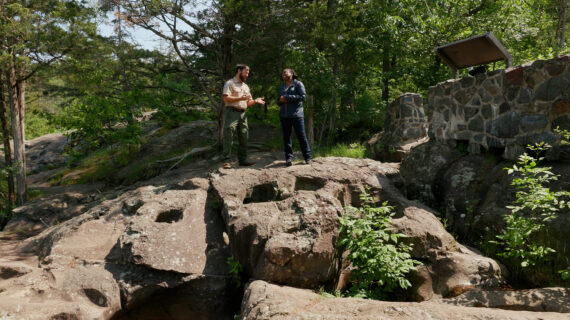
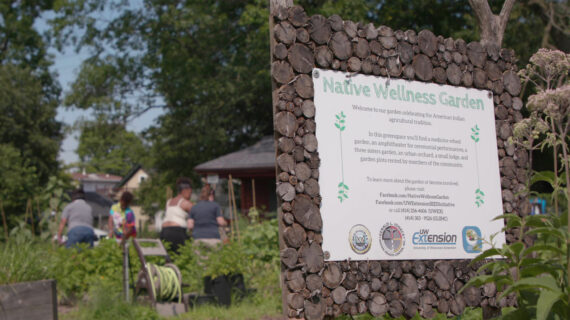


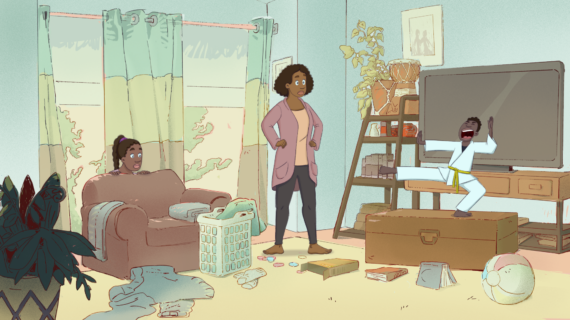
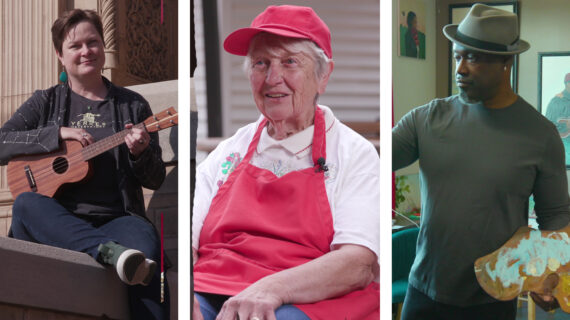

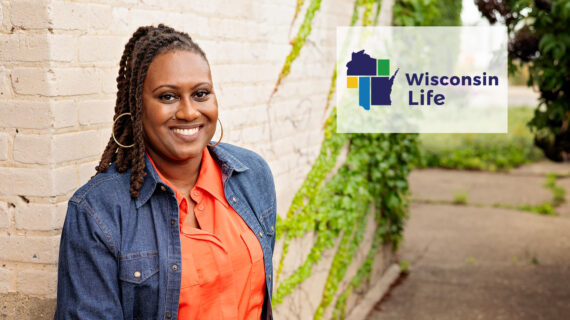


Follow Us